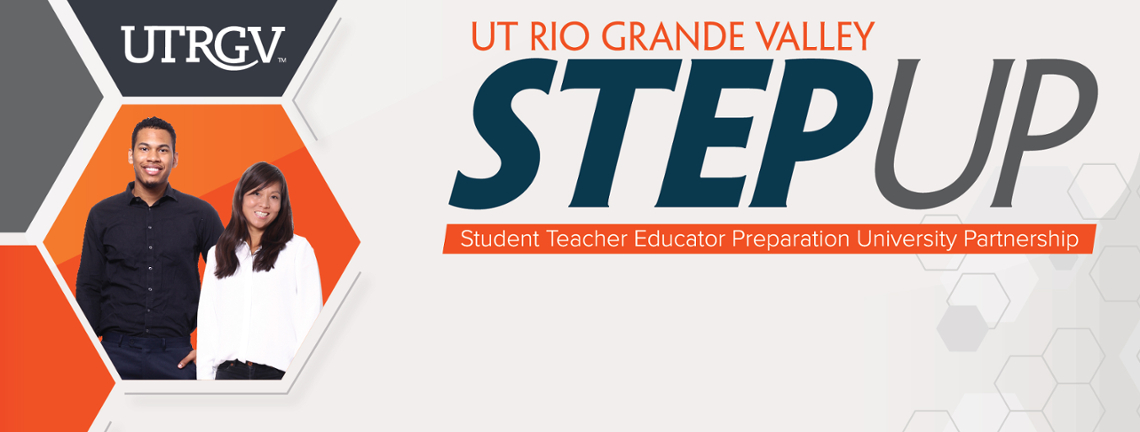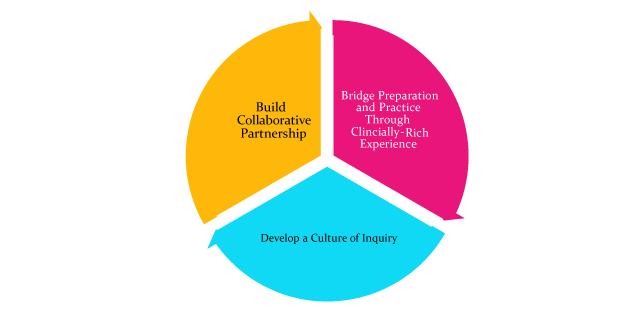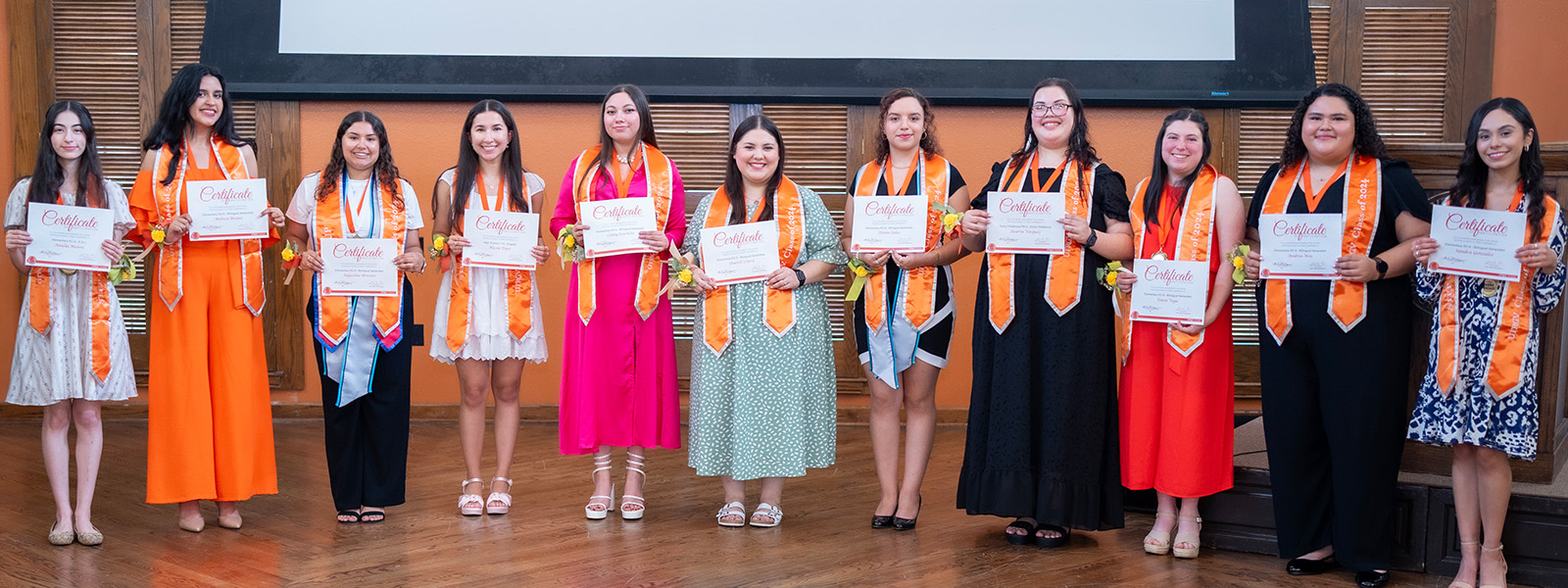
The STEP UP (Student Teacher Educator Preparation: University Partnership) program is a collaborative initiative that gives future educators hands-on teaching experience through a year-long, field-embedded model. It was developed by the Harlingen Consolidated Independent School District (HCISD) and the College of Education and P-16 Integration at UTRGV and began in Fall 2016. Since then, the program has expanded to the McAllen, Los Fresnos, and Brownsville school districts.
The goal of STEP UP is to bridge the gap between theory and practice, allowing teacher candidates to gain practical experience while refining their pedagogical skills. The program incorporates high-quality clinical experiences, a critical component in effective teacher preparation(NCATE, 2010). These experiences are designed to integrate fieldwork with coursework to develop content knowledge and teaching expertise. Experts like Darling-Hammond and Jacobs have highlighted the need for deliberate, inquiry-based field experiences to help future teachers develop their practice.
As a STEP UP candidate, you will spend one day per week in your assigned classroom during the first semester, then transition to full-time student teaching in the same classroom during the second semester. This approach provides a gradual transition from pre-service to the first years of teaching. Throughout the program, you'll receive sustained guidance and mentorship from experienced teachers and university faculty, who will help you analyze student assessment data and differentiate instruction to meet diverse learner needs.
With STEP UP, the goal is to ensure new teachers enter the classroom with the knowledge, skills, and experience of a second-year teacher, ready to engage with students and succeed in their teaching careers.
The College of Education and P-16 Integration invites you to apply for the Spring 2026 cohort for STEP-UP. This is an exciting opportunity to be part of a dynamic teacher preparation program. The Spring 2026 cohort will be selected from applicants in the elementary teacher program and secondary programs according to district needs. To apply, complete the application below. Don't miss out on this fantastic opportunity; the program has limited space.
Apply on Watermark Student Learning & Licensure
Download the STEP UP Program Spring 2026 Application Leaflet
- Immersive and intensive teaching experience designed and implemented by university faculty and district educators,
- Co-teaching opportunities with carefully selected mentor teachers throughout the year-long experience,
- Engagement with university faculty to discuss connections between theory and practice,
- Opportunities to experience a variety of school activities over the school year, participating in all aspects of school life, including in-service training, faculty meetings, and ARD meetings (Admission, Review, and Dismissal) meetings.
- District onboarding to prepare candidates for the expectations, policies, and procedures of the district, in advance of job interviews and the possibility of early hire in the district.
- Admitted into the UTRGV Teacher Preparation program
- Eligible to student teach in Spring 2026.
- 3.0 or Higher GPA
- In the elementary teacher program or secondary per district need
- Selected through an application and interview process.
The success of the original partnership with Harlingen CISD has led to the expansion of the STEP UP program to include McAllen, Los Fresnos, and Brownsville school districts. This broad network allows teacher candidates to gain experience in various school environments. Teacher candidates for the Fall 2025 STEP UP Cohort will be placed in Harlingen CISD, McAllen ISD, or Los Fresnos CISD.
School Districts Quick Links
Access the full article The Content of Thinking
Watch More Below
The conceptual framework of STEP UP centers on providing an intensive clinically-embedded teacher preparation pathway to prospective teachers. STEP UP creates an intersection between preparation and early induction phases of teacher development supported by a university-school district collaborative partnership. Partnerships are essential for powerful clinical preparation in that they bring together the talents, expertise, and resources of both organizations to create environments that integrate theory and evidence-based practice within the context of real classrooms (AACTE, 2010).
STEP UP aligns how teachers are prepared with the needs of the schools. Clinical preparation programs can bridge the gap between preparation and the first years of teaching by creating a common language for all practitioners at a school and district (Center for Teaching Quality, 2013), and preparing teachers by engaging them in habits of mind such as building a culture of inquiry to address authentic school-based needs through scaffolded critical reflective practice. This can be accomplished through the creation of Professional Learning Communities (PLCs), by providing common professional development for all participants, and with new teacher induction programs.
University-based supervisors (for STEP UP, the Site Liaison or Field Supervisor), along with the scaffolding and support offered by experienced cooperating teachers, provide a critical link between the university and the school. Each plays a critical role in the development of the teacher candidate. While cooperating teachers offer guidance in providing teacher candidates multiple and strategic opportunities to practice skills of effective teaching, the quality feedback and increased supervision of university supervisors may result in better outcomes for teacher candidates (Grossman, 2010).

The instructional components of STEP UP are aligned with the objectives of the program and designed to yield opportunities for candidates to develop the skills necessary to be highly effective first year teachers. Two components involve recurrent and scaffolded procedures that provide candidates mentorship to guide the development of their teaching skills.
- Co-planning → Co-teaching, where cooperating teachers serve as models, provide instructional input, and help candidates critically examine instructional practices. Cooperating teachers scaffold instruction in the sequence, providing greater direct support in the beginning, but reducing support over time as candidates demonstrate greater competency and become more independent.
- Instructional opportunities with university supervisor → Candidate application in classroom → Reflection with peers, where candidates are given recurrent opportunities to make connections between course content and practical application in the classroom.
Other key instructional components are:
- Professional Learning Community meetings with all cooperating teachers, candidates, and supervisors, where participants join in ongoing discussions/activities about effective teaching practices.
- Professional Development (PD) for all participants, with a focus on coaching, mentoring, and co-teaching for cooperating teachers.
- Participation of University Faculty in PD, action research, and program research opportunities.
- Focus on Bridging Educational Theory to Classroom Practice, with opportunities for instruction embedded in course/seminar and development of skills through practical application in the classroom.
- Focus on Data Literacy and Evidence-based Practice, with opportunities to develop knowledge and skills in coursework/seminar as applied in the authentic setting of the classroom.
Candidates will attend their classroom one full day each week in their first semester, with additional opportunities for school/district participation (e.g., attendance on the first school day, PD, faculty meeting attendance). In their second semester, teacher candidates will be in their school setting five days a week throughout the semester. Candidates will be responsible for applying to the student teaching program and meeting all Student Teaching Program requirements. Candidates will have multiple and recurrent opportunities to practice their teaching skills, with instruction that is scaffolded and graduated. As candidates progress through their two semesters, they will be expected to take on greater responsibility and independence as teachers in the classroom.
Deadlines
Spring 2026
Open: Saturday, November 1, 2025
Closing: Monday, December 1, 2025
Program Goals and Objectives
The overarching purpose of the partnership is to create and implement a model program that is a clinically-rich, school-embedded pathway in a teacher education program by building a partnership to close the gap between preparation and the first year of teaching through the bridging of theory and teaching practices and habits of mind such as a culture of inquiry to inform future teaching practice. The program will redesign the space between the teacher candidate’s last year at the university and the first year of teaching experience. The ultimate outcome is to prepare teacher candidates who embody teacher leader characteristics and to prepare an experienced pool of UTRGV College of Education graduates to serve as teachers who possess the requisite knowledge, skills, and dispositions to ensure positive outcomes for all learners.
Build a thoughtful, collaborative partnership between the UTRGV teacher preparation program and partner school districts.
Stakeholders will:
- Objective 1.1: Participate in shared planning, decision making, and accountability in developing and implementing the STEP UP program.
- Objective 1.2: Review teacher candidate progress and program data, and participate in decision making for continuous improvement through monthly Steering Committee meetings.
Create a clinically-rich pathway in the teacher preparation program that bridges theory and instructional practices at partner school districts to narrow the gap between teacher preparation and the first year of teaching practice.
Teacher candidates will:
- Objective 2.1: Design, implement, and assess instruction using evidence-based instructional practices.
- Objective 2.2: Engage in critical reflection of and for instruction.
- Objective 2.3: Differentiate instruction for students with diverse needs.
- Objective 2.4: Apply theoretical constructs learned in coursework to instructional planning, delivery, and assessment.
- Objective 2.5: Implement culturally responsive instructional strategies.
- Objective 2.6: Implement culturally responsive classroom management strategies
- Objective 2.7: Implement culturally responsive strategies focused on family engagement.
Develop a culture of inquiry that focuses on evidence-based decision making and data literacy to inform teaching practices.
Teacher candidates will:
- Objective 3.1: Design and administer student assessments that yield meaningful data for informing instruction.
- Objective 3.2: Collect and synthesize data from multiple sources to make effective instructional decisions.
- Objective 3.3: Analyze and interpret data for instructional decision making.
- Objective 3.4: Apply evidence-based practices to instructional planning and delivery.
Partnership Members' Roles and Responsibilities
All members of the school and university play a vital role in the success of the teacher candidate developing to professional teacher. The following outlines essential roles and responsibilities in STEP UP for teacher candidates, university supervisor, and cooperating teachers for the fall and spring semesters.
- Commit to complete a 2-semester program.
- Adhere to all district and university policies.
- Demonstrate a high level of professionalism.
- Attend one assigned full day every week of the semester at their respective school.
- Attend the entire first week of class at their respective school.
- Attend Professional Learning Community (PLC) meetings with other teacher candidates and their cooperating teachers.
- Participate in co-planning, co-teaching, and feedback conferences with cooperating teacher and university supervisor. Co-teaching roles will vary over the semester, with the candidate taking on greater responsibility as the semester progresses.
- Participate in professional development, faculty meetings, and other district sponsored events.
- Actively participate in their own professional development in the authentic setting of a real classroom by setting goals and focusing on continuous improvement.
- Be receptive to engage in other activities contributing to professional development.
- Opportunity to substitute teach.
- Adhere to district and university policies.
- Continue to demonstrate a high level of professionalism and participate in the school/district meetings and events teachers are expected to attend
- Attend the equivalent of 14 5-day weeks over the spring semester and fulfill responsibilities of student teacher.
- By starting on the district start day, students may periodically substitute teach throughout the semester one day a week—optional but recommended.
- Continue to attend PLC meetings and Group Seminar meetings.
- Participate in planning and post-teaching conferences with the cooperating teacher.
- Take on more planning, teaching, and administrative responsibility in the classroom as the semester progresses.
- Participate in parent meetings.
- Participate in mock interview process with district personnel.
- Actively participate in a seamless transition from student to professional.
- Commit to a process of scaffolding instruction/learning and provide ongoing support for teacher candidates during both semesters.
- Serve as a liaison between the university and the school district.
- Facilitate seminar discussions with teacher candidates and engage in the discourse of excellent teaching with teacher candidates and cooperating teachers.
- Demonstrate effective teaching practices.
- Demonstrate differentiated instruction for students of various backgrounds and abilities.
- Observe instructional lessons and provide feedback to teacher candidates.
- Communicate with cooperating teachers and assist with recommendations where appropriate.
- Participate in documenting the implementation of STEP UP.
- Commit to a 2-semester program of mentorship.
- Attend all professional development opportunities as provided by the district and university pertaining to the program.
- Commit to a process of scaffolding instruction/learning and provide ongoing support for teacher candidates during both semesters.
- Meet with teacher candidates for co-planning and post-teaching conferences to discuss effective practices and provide feedback for improvement.
- Engage in co-teaching lessons with the teacher candidate. Scaffold the experience so that the teacher candidate can take on different roles and greater responsibility as the semester progresses.
- Demonstrate/model characteristics of highly effective teaching throughout the semester, including responsive teaching practices for all students of various backgrounds and abilities (e.g., effective differentiated instruction).
- Engage the teacher candidate in the ongoing discourse of highly effective teaching, especially when providing feedback to the teacher candidate.
- Attend monthly meetings with faculty liaison.
- Communicate with the faculty liaison about teacher candidate progress and concerns, in addition to soliciting feedback and recommendations as needed.
- Engage in discussions with university faculty about action research projects; participate in projects if agreed upon.
- In the second semester, conduct a minimum of 3 formal observations for each student, with pre- and post-conferences to discuss the evaluation.
- In the second semester, collaborate with university supervisor to conduct two 3-way conferences for the teacher candidate.

